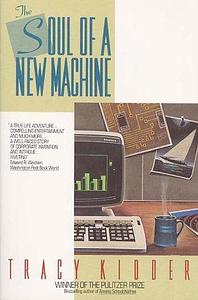Take a photo of a barcode or cover
The last email for the day is sent. There are no more calls tonight. And you settle in, warming your bones beside the proverbial fire. Music now fills the room.
The thrill is gone
The thrill is gone away
As you take comfort in the king of blues, you reflect on your work, once your passion.
After many years as a software engineer, one day you find that have ended up with a 'job'. Its hard to pin point when the fun went out of building things. If you find yourself agreeing to BB King, it would be a good time to pick up this book.
Tracy Kidder takes you along on the fascinating journey of this team of engineers as they build The Eagle at Data General. The scene is familiar. An aggressive and brash company - a bastard in the world of IBMs. A young team set up with an impossible deadline, and oh did someone mention the survival of the company depends on the team delivering on time.
The book is more that long hours and the sweat and grit. Kidder introduces you to the engineers, each unique in their on way and also so familair to someone you know from work. The book anchors around Tom West, the man of conviction, man of action. He's the phantom, the jesus reincarnated as bobcat. Nobody knows what he does, but at the end, when you look back you see his magic. The glue that binds all of it together.
"Not everything worth doing is worth doing well", says West. Of late, I am convinced that to build a great product, more than skill you need conviction that you can build a great project.
Data General is a place where Mushroom Management is thriving (keep them in the dark, feed them bullshit). But you encounter some very real people in this book. You encounter the passion, the reason why builders build! I loved this book for that.
"Look, I don't have to get official recognition for anything I do. Ninety-eight percent of the thrill comes from knowing that the thing you designed works, and works almost the way you expected it would. If that happens, part of you is in that machine."
At the end, it all comes down to a game of Pinball, says West. You win, you get to play again. You ship, you get to build again. That is what the people are in for. Thats the reason why we build. There are no morals, you take away what you want to. (There is plenty of wisdom though).
I cant believe the book is as old as me. The team, the suitation, the people are still relevant. If you replace MUD with Quake2, this book could pass off for my generation. Maybe it can pass of the current generation too.
The book took me down the memory lane, the good old days when coding was fun. When you lived by the motto "I did it for the kicks". Maybe its the nostalgia speaking, but everything looks better in old photographs. The book has been a great reminder for me, holding a mirror and asking "are you having fun?"
PS: This year 2000 article O, Engineers! that tracks down the engineers after 18 years of the Soul makes a fascinating after-read.
The thrill is gone
The thrill is gone away
As you take comfort in the king of blues, you reflect on your work, once your passion.
After many years as a software engineer, one day you find that have ended up with a 'job'. Its hard to pin point when the fun went out of building things. If you find yourself agreeing to BB King, it would be a good time to pick up this book.
Tracy Kidder takes you along on the fascinating journey of this team of engineers as they build The Eagle at Data General. The scene is familiar. An aggressive and brash company - a bastard in the world of IBMs. A young team set up with an impossible deadline, and oh did someone mention the survival of the company depends on the team delivering on time.
The book is more that long hours and the sweat and grit. Kidder introduces you to the engineers, each unique in their on way and also so familair to someone you know from work. The book anchors around Tom West, the man of conviction, man of action. He's the phantom, the jesus reincarnated as bobcat. Nobody knows what he does, but at the end, when you look back you see his magic. The glue that binds all of it together.
"Not everything worth doing is worth doing well", says West. Of late, I am convinced that to build a great product, more than skill you need conviction that you can build a great project.
Data General is a place where Mushroom Management is thriving (keep them in the dark, feed them bullshit). But you encounter some very real people in this book. You encounter the passion, the reason why builders build! I loved this book for that.
"Look, I don't have to get official recognition for anything I do. Ninety-eight percent of the thrill comes from knowing that the thing you designed works, and works almost the way you expected it would. If that happens, part of you is in that machine."
At the end, it all comes down to a game of Pinball, says West. You win, you get to play again. You ship, you get to build again. That is what the people are in for. Thats the reason why we build. There are no morals, you take away what you want to. (There is plenty of wisdom though).
I cant believe the book is as old as me. The team, the suitation, the people are still relevant. If you replace MUD with Quake2, this book could pass off for my generation. Maybe it can pass of the current generation too.
The book took me down the memory lane, the good old days when coding was fun. When you lived by the motto "I did it for the kicks". Maybe its the nostalgia speaking, but everything looks better in old photographs. The book has been a great reminder for me, holding a mirror and asking "are you having fun?"
PS: This year 2000 article O, Engineers! that tracks down the engineers after 18 years of the Soul makes a fascinating after-read.
Terrific look at a piece of computer history written at the time it was actually happening. I'd just read Tracey Kidder's book about writing and as a fan of computer history thought this would be a good read. It was as a team puts together Data Generals first 32 bit minicomputer. I'd recommend this book to anyone that enjoys computer history. Well written and fast paced.
Bought this not realising it was non fiction. It was a very dry account of the creation of a computer system and its issues in the late 1970s and early 1980s.
I liked this book. A fun look at how a new computer was devised and how the team that did it worked. Trippy to read now, several decades later, when almost everything about computers is so different.
informative
reflective
medium-paced
I have no idea how to get a computer from pieces of precious metals to a functioning device in a product line, but this book does. I enjoyed the level of detail it got to, and it encouraged me to Google some of the topics (like boolean algebra or logic gates). If that type of stuff interests you (even if you're not an engineer or a math whiz), then this is a book for you!
A little more on the technical side for me, not a bad book per se, just not my cup of tea.
So I read this pretty much back when it first came out, back in Paleozoic times of computers, 1981. In fact, I had just embarked on my own career in computers at that time, so this was a book about where I was going. I remember liking it quite a bit, although I thought the software group got the short end of the stick in the book. Only natural, I suppose, as I am a software guy.
Then I recently read a blog post about re-reading this Pulitzer Prize winning book and how it still resonated with the author of the post. And I thought, hey, why not give this another try, this time from the other end of my career, where I have seen an awful lot that I am sure this book talks about.
And you know what? It basically holds up, even today. The book has a shocking amount of nonchalant misogyny in it, especially at the beginning. Talk about making the computer go faster than a "raped ape", to secretary talking about how engineering is a guy's game. That's not too surprising, I guess, and it also isn't surprising that I totally missed that when I first read it, although even then I had plenty of women co-workers, all excellent at their jobs. In fact, now that I think about it, those few times in my career where I have had to share an office, I shared with a woman! Odd.
But it smoothed out a bit as the book when along, where Kidder makes a point of how Data General supposedly tried extra hard to find a women hardware engineer and there was at least one or two on the team. Even if they didn't really try, just the mere mention of it softened the blow.
And of course the technology is laughably ancient. We are talking about hard-wiring the first generation of 32(!) bit computers here. Literally debugging by swapping out wires, or making a new connection. And talking about putting the ALU (a tiny part of today's CPU) on a single board to make it cost effective. Tis to laugh!
But towards the end of the book there were some interesting ruminations on computers and how they might be used in the future that are surprisingly prescient. And, I think, these questions are still relevant and worth thinking about today.
So I think it was definitely worth a reread. Some things never change - companies wringing every last ounce of blood for those who are committed to the project. The EA Spouse letter is a prefect example, as this is especially true in the computer game programming industry, which I burn out of a long time ago. And the people in the industry are still very much the same. So I think if you are an industry newbie or a veteran, this book is definitely worth checking out, either for the first time or, like me, late in your career.
Then I recently read a blog post about re-reading this Pulitzer Prize winning book and how it still resonated with the author of the post. And I thought, hey, why not give this another try, this time from the other end of my career, where I have seen an awful lot that I am sure this book talks about.
And you know what? It basically holds up, even today. The book has a shocking amount of nonchalant misogyny in it, especially at the beginning. Talk about making the computer go faster than a "raped ape", to secretary talking about how engineering is a guy's game. That's not too surprising, I guess, and it also isn't surprising that I totally missed that when I first read it, although even then I had plenty of women co-workers, all excellent at their jobs. In fact, now that I think about it, those few times in my career where I have had to share an office, I shared with a woman! Odd.
But it smoothed out a bit as the book when along, where Kidder makes a point of how Data General supposedly tried extra hard to find a women hardware engineer and there was at least one or two on the team. Even if they didn't really try, just the mere mention of it softened the blow.
And of course the technology is laughably ancient. We are talking about hard-wiring the first generation of 32(!) bit computers here. Literally debugging by swapping out wires, or making a new connection. And talking about putting the ALU (a tiny part of today's CPU) on a single board to make it cost effective. Tis to laugh!
But towards the end of the book there were some interesting ruminations on computers and how they might be used in the future that are surprisingly prescient. And, I think, these questions are still relevant and worth thinking about today.
So I think it was definitely worth a reread. Some things never change - companies wringing every last ounce of blood for those who are committed to the project. The EA Spouse letter is a prefect example, as this is especially true in the computer game programming industry, which I burn out of a long time ago. And the people in the industry are still very much the same. So I think if you are an industry newbie or a veteran, this book is definitely worth checking out, either for the first time or, like me, late in your career.





